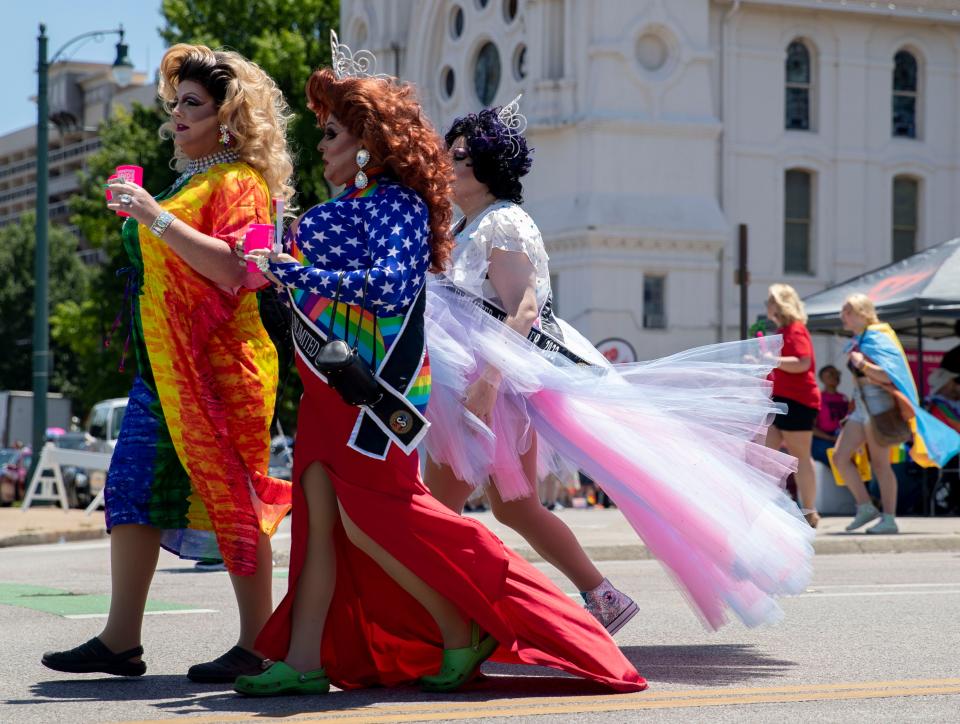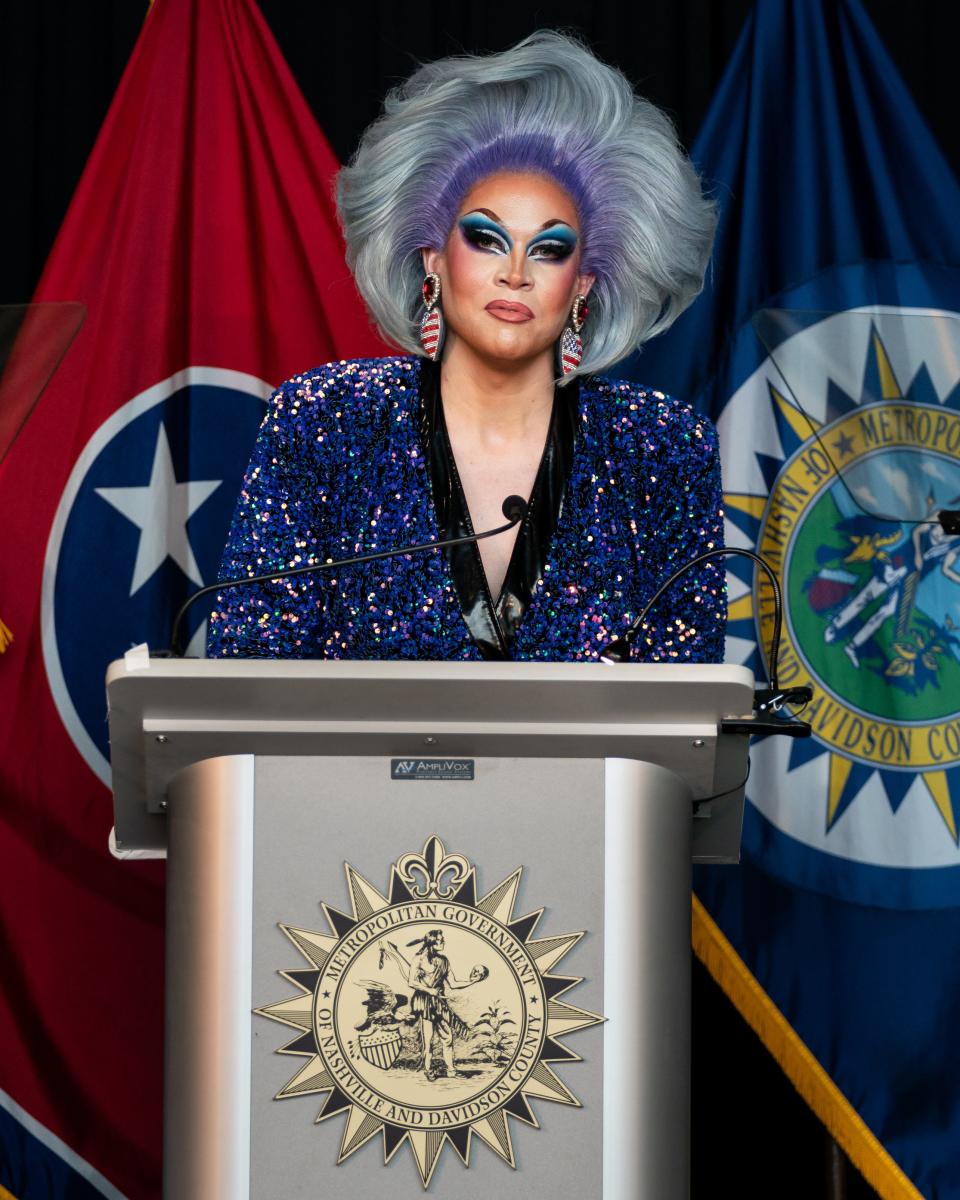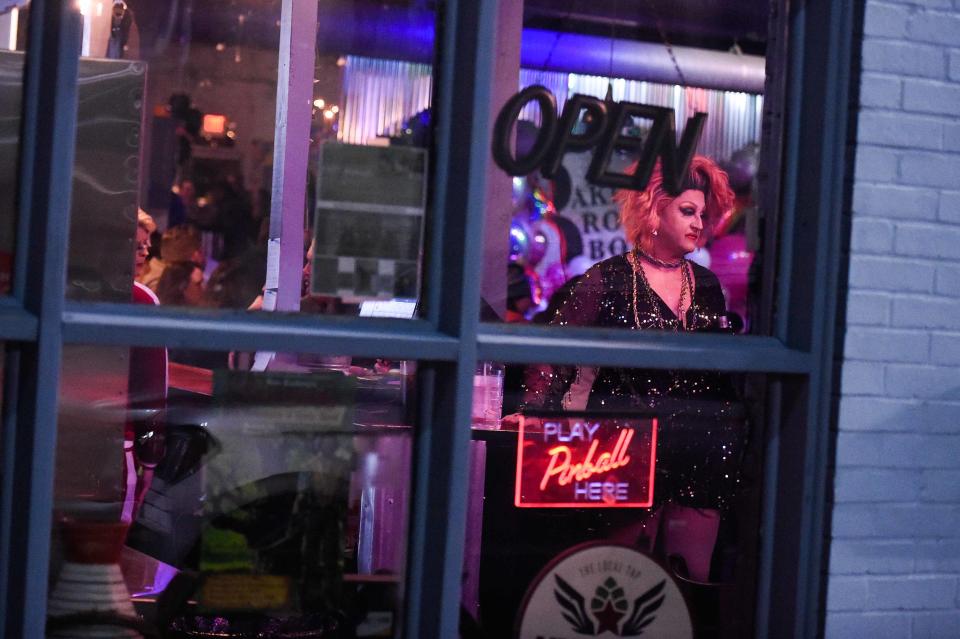Federal judge rules against TN's drag law: 5 notable First Amendment arguments in decision
A Memphis federal judge tossed out Tennessee’s controversial Adult Entertainment Act just late last week — calling the state law that could have targeted some drag performers “an unconstitutional restriction on the freedom of speech.”
Judge Thomas Parker, a Trump-appointed federal judge from the Western District of Tennessee, ruled the law unconstitutional after a trial in June. He temporarily blocked the law from taking effect on April 1.
The bill expanded the definition of adult cabaret by, in part, adding "male and female impersonators" and restricting them from performing in public spaces or where children could witness them if the performances were deemed "harmful to minors." Gov. Bill Lee signed the bill into law in March.

Friends of George’s, a Memphis-based LGBTQ theatre group, challenged the law in federal court shortly after Lee signed the bill.
More: What to know after federal judge tosses out Tennessee's anti-drag law
Lee said Monday he still supports the law and Attorney General Jonathan Skrmetti has indicated an appeal is likely.
Parker’s 70-page opinion on the ruling relies heavily on the First Amendment and its free speech protections. The judge did not shy away from criticizing the state, stating the law was “passed for the impermissible purpose of chilling constitutionally-protected speech.”
Here are five key First Amendment arguments the judge made in his decision.
Content and viewpoint-based restrictions on speech
“As a matter of text alone, the AEA is a content-based and viewpoint-based restriction on speech,” the judge wrote, adding that “Tennessee has a compelling state interest in protecting the physical and psychological well-being of minors, but the Defendant has not met his burden of proving that the AEA is both narrowly tailored and the least restrictive means to advance Tennessee’s interests.”
In other words, though while Parker acknowledged that the state has vested interest in keeping children safe and well, the lawyers for the state could not prove that the AEA met those needs while also avoiding restricting speech.
Vague language makes it hard to determine compliance
Parker likened the risk of breaking the law to eating a poisonous mushroom, pointing out that the law was written so vaguely that actors with Friends of George’s could not determine whether they were breaking it or not — chilling their speech.
“(The state) argues that they think (Friends of George’s) exhibits are not ‘harmful to minors’ under the AEA,” Parker said. “But this would lead (Friends of George’s) taking an enormous risk. It would have to eat the proverbial mushroom to find out whether it is poisonous.”
Differences between obscene legally and obscene vernacularly
The new state law dealt Tennessee's obscenity code and Parker said there was a difference between “obscene” in a legal sense and “obscene” in a vernacular sense. Even if a drag performance were to be sexually explicit, it may not rise to the definition of legal obscenity.
“There is no question that obscenity is not protected by the First Amendment,” he said. “Legal obscenity is an exceptionally high standard as one of its prongs requires that the speech 'not have serious literary, artistic, political or scientific value.' Moreover, speech that is obscene — which may even be harmful to minors — is a different category from obscenity."

“Simply put, no Supreme Court has held that sexually explicit — but not obscene — speech receives less protection that political, artistic or scientific speech.”
Parker further referenced the 2002 case of Ashcroft v. A.C.L.U. to support this argument, which stated that “It is also well established than speech may not be prohibited because it concerns subjects affecting our sensibilities.”
Judge calls language outdated and discriminatory
The judge did not mince words in this ruling, calling out the state legislature for using “problematic” language that “may have escaped many readers' scrutiny in 1987, (but) may not do so with ease in 2023.”
He said that legislators are correct in their frequent argument that although the AEA pulled language from existing law—being the Adult-Oriented Establishment Registration Act (AERA) of 1987 — the language used in that law is used very differently in the new law.
AERA regulates adult-oriented businesses that are zoned in fixed locations — while AEA regulates the performers themselves, “implicating their First Amendment rights," the judge said.

“What this means is that the AERA and AEA share similar language but operate differently,” Parker said. “Even though the 'male or female impersonator’ language appears in both, it employs no viewpoint-discrimination in the AERA context because it regulates the business owner — the employer of the ‘male or female impersonator.’ By contrast, the same language matters greatly in the AEA, which regulates the 'male or female impersonator.' Simply put, the AEA directly impacts the performers’ First Amendment rights in a way that the AERA does not.”
Drag not mentioning law but judge says lawmakers targeted it
Drag is not mentioned specifically in the new state law but the legislation was introduced in the wake of controversies surround the performances across the state. Parker said while some lawmakers tried to distance the bill from directly targeting drag performers after facing criticism, statements made lawmakers pointed to the contrary.
“The word ‘drag’ never appears in the text of the AEA,” Parker said. “But the Court cannot escape that ‘drag’ was the one common thread in all three specific examples of conduct that was considered ‘harmful to minors,’ in the legislative transcript.”
Parker points to the state’s sole witness who spoke in favor of the AEA, Landon Starbuck, who mentioned Boro Pride as the specific example of a performance that is harmful to minors.
Rep. Jason Zachary, R-Knoxville, cited a drag performance in Knox County as "an example of a performance that he thinks the AEA would protect children from," according to the judge's opinion. Rep. Chris Todd, R-Madison County, who sponsored the House version of the bill, "identified a 'drag show' as an instance of adult cabaret entertainment," Parker write.
“When (Todd) explained why he was ‘asked to come up with legislation’ that led to the AEA, he recounted the events behind a ‘drag show’ in Jackson — in doing so, not once did he mention any overly sexual content that affects children,” Parker wrote. “He had not yet seen the performance and therefore could not have made a sound determination about the show’s sexual impropriety for minors."
“His statement as House sponsor of the bill suggests that the AEA was not proposed to empower the state to protect minors from actual instances of indecent ‘adult cabaret entertainment,’ but rather that the AEA is geared towards placing prospective blocks on drag shows — regardless of their potential harm to minors.”

This led to Parker’s conclusion that the AEA does not meet the Supreme Court’s requirement of a First Amendment restriction being “narrowly drawn,” based on its over-broad text and legislative history.
“The TN General Assembly carelessly, if not intentionally, passed the AEA for the inappropriate purpose of chilling constitutionally free speech,” he said.
Zachary has urged the attorney general to appeal and criticized the judge's decision.
"We will continue to take every step necessary to ensure children in our state are not subjected to public acts of perversion," he posted on Twitter.
Likewise, Todd took aim at the judge's ruling. "Although I’m disappointed that this court ignored decades of Supreme Court precedent, I’m confident the law is narrowly tailored to protect our kids from sexually explicit performances," he said on Twitter.
The USA Today Network - Tennessee's coverage of First Amendment issues is funded through a collaboration between the Freedom Forum and Journalism Funding Partners.
Have a story to tell? Reach Angele Latham by email at alatham@gannett.com, by phone at 731-343-5212, or follow her on Twitter at @angele_latham
This article originally appeared on Nashville Tennessean: Drag restriction law thrown out by judge for violating free speech

